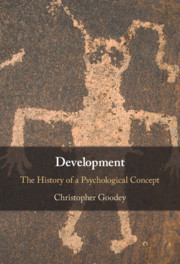Book contents
- Development
- Development
- Copyright page
- Contents
- Acknowledgements
- Introduction
- Chapter 1 Development and the Origin of Psychological Concepts
- Chapter 2 The History of Christianity and the First Principles of Development: Linear Time, Interiority, Structure
- Chapter 3 The History of Education: Rearing the Elect Child
- Chapter 4 Pascal on the Ordering of Human Time
- Chapter 5 The Normalization of the Elect: Locke to Montesquieu
- Chapter 6 The Coining of a Developmental Theory: Leibniz to Bonnet
- Chapter 7 Emile: Rousseau’s Well-Ordered Developer
- Chapter 8 Nature versus Nurture and Cognitive Ability Testing: Historical Sketches
- Postscript Further Targets for Historical Research
- Index
Chapter 7 - Emile: Rousseau’s Well-Ordered Developer
Published online by Cambridge University Press: 10 June 2021
- Development
- Development
- Copyright page
- Contents
- Acknowledgements
- Introduction
- Chapter 1 Development and the Origin of Psychological Concepts
- Chapter 2 The History of Christianity and the First Principles of Development: Linear Time, Interiority, Structure
- Chapter 3 The History of Education: Rearing the Elect Child
- Chapter 4 Pascal on the Ordering of Human Time
- Chapter 5 The Normalization of the Elect: Locke to Montesquieu
- Chapter 6 The Coining of a Developmental Theory: Leibniz to Bonnet
- Chapter 7 Emile: Rousseau’s Well-Ordered Developer
- Chapter 8 Nature versus Nurture and Cognitive Ability Testing: Historical Sketches
- Postscript Further Targets for Historical Research
- Index
Summary
The application of the word ‘development’ to a fully formulated principle of temporal Order becomes ubiquitous in Rousseau’s Emile. The biologist Buffon, the psychologist Condillac and particularly Bonnet all influenced this seminal treatise. But where they had written of development only occasionally and in an abstract sense, with Rousseau it becomes normative and the main descriptor of the structured lifespan of the individual. Rousseau retains the older sense of development as the ‘unfolding’ of an already existing, preformed structure; nevertheless, he also reveals in outline the modern human sciences’ presupposition that the child is an incomplete being. Thanks to Bayle and Diderot, Rousseau derived his concept of a political General Will, irrespective of the individual will, from that of God’s general will to save humankind that does not take individual behaviours into account; this has its psychological equivalent in Rousseau’s creation of ‘the abstract man’, against whose developmental norms the individual must be measured.
Keywords
- Type
- Chapter
- Information
- DevelopmentThe History of a Psychological Concept, pp. 166 - 185Publisher: Cambridge University PressPrint publication year: 2021

